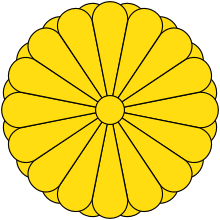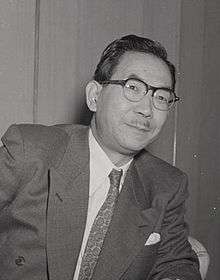Japanese general election, 1976
| | ||||||||||||||||||||||||||||||||||||||
| ||||||||||||||||||||||||||||||||||||||
| ||||||||||||||||||||||||||||||||||||||
| ||||||||||||||||||||||||||||||||||||||
 |
| This article is part of a series on the politics and government of Japan |
|
Related topics |
|
|
General elections were held in Japan on 5 December 1976. The result was a victory for the Liberal Democratic Party, which won 249 of the 511 seats,[1] but the election was overshadowed by the Lockheed bribery scandals and became popularly known as the Lockheed Election (ロッキード選挙 rokkīdo senkyo).[2] As a result of the scandals, the LDP lost 22 seats, mainly to the Komeitō Party, and lost its majority control over the House of Representatives. However, the LDP still remained the largest party in the House of Representatives. Voter turnout was 73.45%.
The 1976 election was the only post-war general election triggered by an expiration of the term of the House of Representatives; all other post-war elections have been instigated by a dissolution of the House by the Cabinet.[2]
Results
| Party | Votes | % | Seats | +/- |
|---|---|---|---|---|
| Liberal Democratic Party | 23,653,626 | 41.8 | 249 | -22 |
| Japan Socialist Party | 11,713,009 | 20.7 | 123 | +5 |
| Komeitō | 6,177,300 | 10.9 | 55 | +26 |
| Japanese Communist Party | 5,878,192 | 10.4 | 17 | -21 |
| Democratic Socialist Party | 3,554,076 | 6.3 | 29 | +10 |
| New Liberal Party | 2,363,985 | 4.2 | 17 | +17 |
| Other parties | 45,114 | 0.1 | 0 | -2 |
| Independents | 3,227,463 | 5.7 | 21 | +7 |
| Total | 56,612,765 | 100 | 511 | +20 |
| Source: http://www.stat.go.jp/data/chouki/27.htm | ||||
References
- ↑ 第27章 公務員・選挙 http://www.stat.go.jp/data/chouki/27.htm
- 1 2 "これまでの衆議院選挙" (PDF). Japan Association of Corporate Executives (Keizai Doyukai). Retrieved 27 January 2014.
